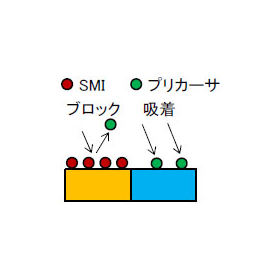[LC/MS] Liquid Chromatography Mass Spectrometry
It is an analytical method that detects ions with a detector and performs qualitative and quantitative analysis.
Liquid chromatography (LC) is classified as a type of chromatographic method that separates components of a liquid sample based on chromatographic principles. The detection of the separated components using a mass spectrometer is referred to as liquid chromatography-mass spectrometry (LC/MS). LC/MS is an analytical technique for the qualitative and quantitative analysis of organic compounds. - Effective for analyzing components with relatively large molecular weights or relatively high polarity. - By selecting the ionization method, it can accommodate thermally unstable substances and others. - There are various ionization methods available, allowing detection using the most suitable ionization method for the component (Electrospray Ionization (ESI), Atmospheric Pressure Chemical Ionization (APCI), Atmospheric Pressure Photoionization (APPI)). - High mass resolution can be achieved using mass spectrometers that utilize the Time-of-Flight method.
basic information
■Column Separation A liquid (or dissolved) sample is introduced into the column. Each component in the sample is separated based on the differences in affinity (retention) to the stationary phase and mobile phase within the column. By applying high pressure within the column, the separation and detection capabilities of the column separation can be enhanced. ■Detector The separated components are detected by a detector (chromatograph). Qualitative analysis can be performed from the retention time of the chromatograph (horizontal axis), and quantitative analysis can be conducted from the peak area. Additionally, estimation and identification of components can be achieved through absorption spectra and mass spectra.
Price information
-
Delivery Time
Applications/Examples of results
- Component analysis of cleaning solution - Trace impurity analysis in solution - Purity evaluation of materials - Qualitative analysis of device materials - Quantitative analysis of additives in chemical solutions - Qualitative analysis of inkjet materials - Qualitative and quantitative analysis in agriculture, biochemistry, biotechnology, and biomaterials
Detailed information
-

Please consult with us first. ★ We will start with a proposal for the analysis plan ★ We can, of course, meet at your company for discussions. We will carefully explain the analysis results and leave no questions unanswered. Please contact us at 03-3749-2525 or info@mst.or.jp!
-

We will hold a visiting seminar. ★We offer free seminars with engineers tailored to our customers' needs★ Depending on your requests, we will introduce analytical techniques and explain analytical data. ◆Examples of seminar content - A broad explanation of MST analytical methods - A detailed explanation of specific analytical methods from the principles - An explanation of the analytical data requested by the customer Please contact us at 03-3749-2525 or info@mst.or.jp!
Recommended products
Distributors
MST is a foundation that provides contract analysis services. We possess various analytical instruments such as TEM, SIMS, and XRD to meet your analysis needs. Our knowledgeable sales representatives will propose appropriate analysis plans. We are also available for consultations at your company, of course. We have obtained ISO 9001 and ISO 27001 certifications. Please feel free to consult us for product development, identifying causes of defects, and patent investigations! MST will guide you to solutions for your "troubles"!



















































